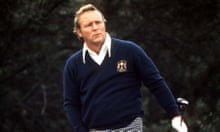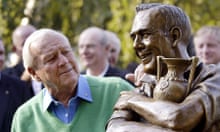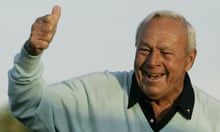Arnold Palmer, one of the greatest players in the history of golf, has died at the age of 87, a source close to the family confirmed to magazine Golfweek.
It was reported he died on Sunday in Pittsburgh, Pennsylvania. Palmer’s health has been in decline for some time.
His great rival Jack Nicklaus said on Twitter Palmer was a “legend” and “icon”, but also “one of my best friends”.
“He was the king of our sport and always will be,” Nicklaus wrote.
I just got the news at about 8:45 that Arnold had passed. I was shocked to hear that we lost a great friend—and… https://t.co/MLtCJR2Jxe
— Jack Nicklaus (@jacknicklaus) September 26, 2016
Tiger Woods thanked Palmer for his “friendship, counsel and a lot of laughs”.
“Your philanthropy and humility are part of your legend,” Woods said on Twitter.
“It’s hard to imagine golf without you or anyone more important to the game than the King.”
Thanks Arnold for your friendship, counsel and a lot of laughs. Your philanthropy and humility are part of your legend.
— Tiger Woods (@TigerWoods) September 26, 2016
Palmer turned pro in 1955, winning a tournament in his first year on the tour and eventually claiming seven majors – six of them in the five-year period between 1960 and 1964, when he firmly established himself as a star of world sport and established a rivalry with Jack Nicklaus. Augusta was a particularly happy hunting ground – four of his majors came at the Masters.
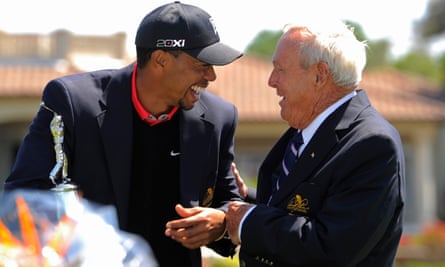
The son of a country club greenskeeper was also a trailblazer off the course, leveraging his booming stardom – built on a combination of his good looks, charisma and aggressive play – at the start of sport’s television age to become a walking billboard for corporate America. He also developed the “Arnold Palmer” beverage, his post-round combination of iced tea and lemonade, which became an empire of its own.
Palmer said his upbringing helped him find success on the golf course. “When I was six years old, my father put me on a steel-wheeled tractor,” he recalled in a 2011 interview with the AP. “I had to stand up to turn the wheel. That’s one thing made me strong. The other thing was I pushed mowers. In those days, there were no motors on anything except the tractor. The mowers to cut greens with, you pushed.”
With his common touch and everyman persona, Palmer was also credited with breaking down the class barriers and democratising an elitist sport, introducing golf to a blue collar audience and sparking the popularity of the game amongst a legion of new fans who’d previously been shut out.
“If it wasn’t for Arnold, golf wouldn’t be as popular as it is now,” Woods said in 2004. “He’s the one who basically brought it to the forefront on TV. If it wasn’t for him and his excitement, his flair, the way he played, golf probably would not have had that type of excitement. And that’s why he’s the king.”
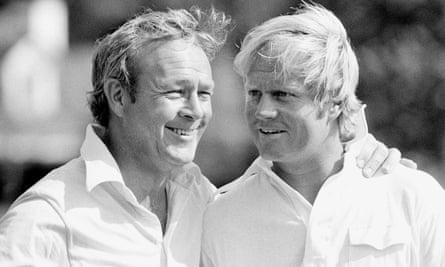
Palmer won the PGA lifetime achievement award in 1998 and was one of the 13 original inductees to the world golf hall of fame. Golf Digest magazine rated him the sixth greatest golfer of all time. In 2004 he became the first golfer to be awarded the Presidential medal of freedom and five years later became the second, after Byron Nelson, to be awarded the Congressional gold medal.
Figures from around the world of golf paid tribute to Palmer on Sunday night. “Will miss that vice handshake and glint in your eye as you tried to crush my hand. RIP King Arnold,” wrote Nick Faldo on Twitter.
Palmer’s first wife, Winifred Walzer, who he wed in 1955, died of cancer in 1999. He married Kathleen Gawthrop in 2005 and became a strong advocate for cancer research programs, having undergone successful prostate cancer surgery himself in 1997. He is survived by his two daughters, Peggy Palmer Wears and Amy Palmer Saunders, as well as six grandchildren and nine great-grandchildren.

